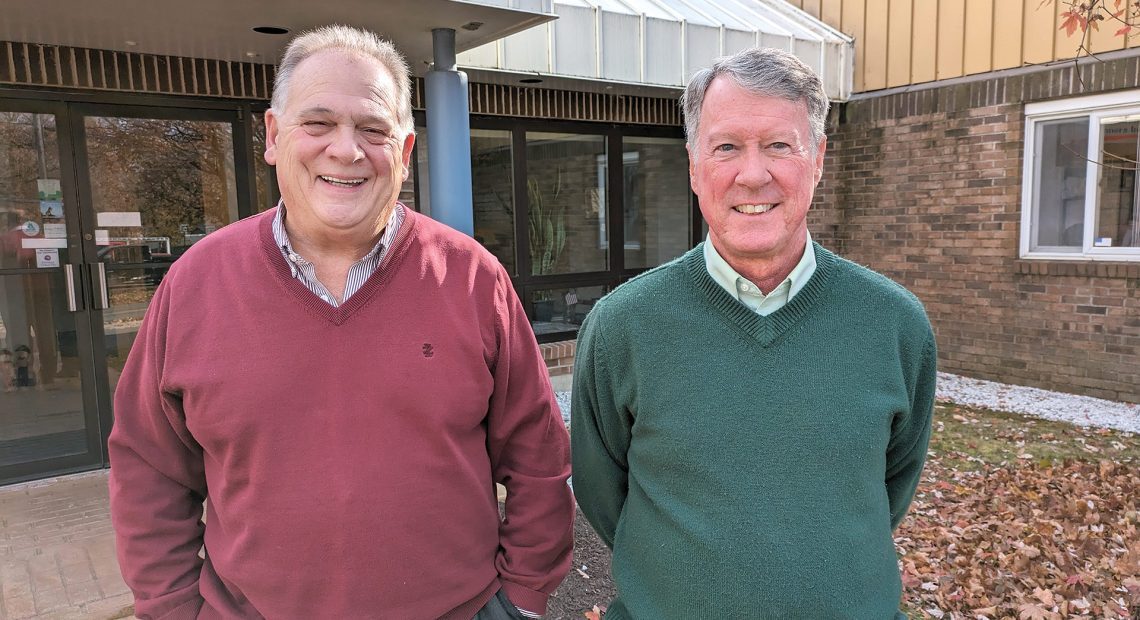
Hill-Engineers, Architects, Planners Marks 75 Years of Change
Something to Build On
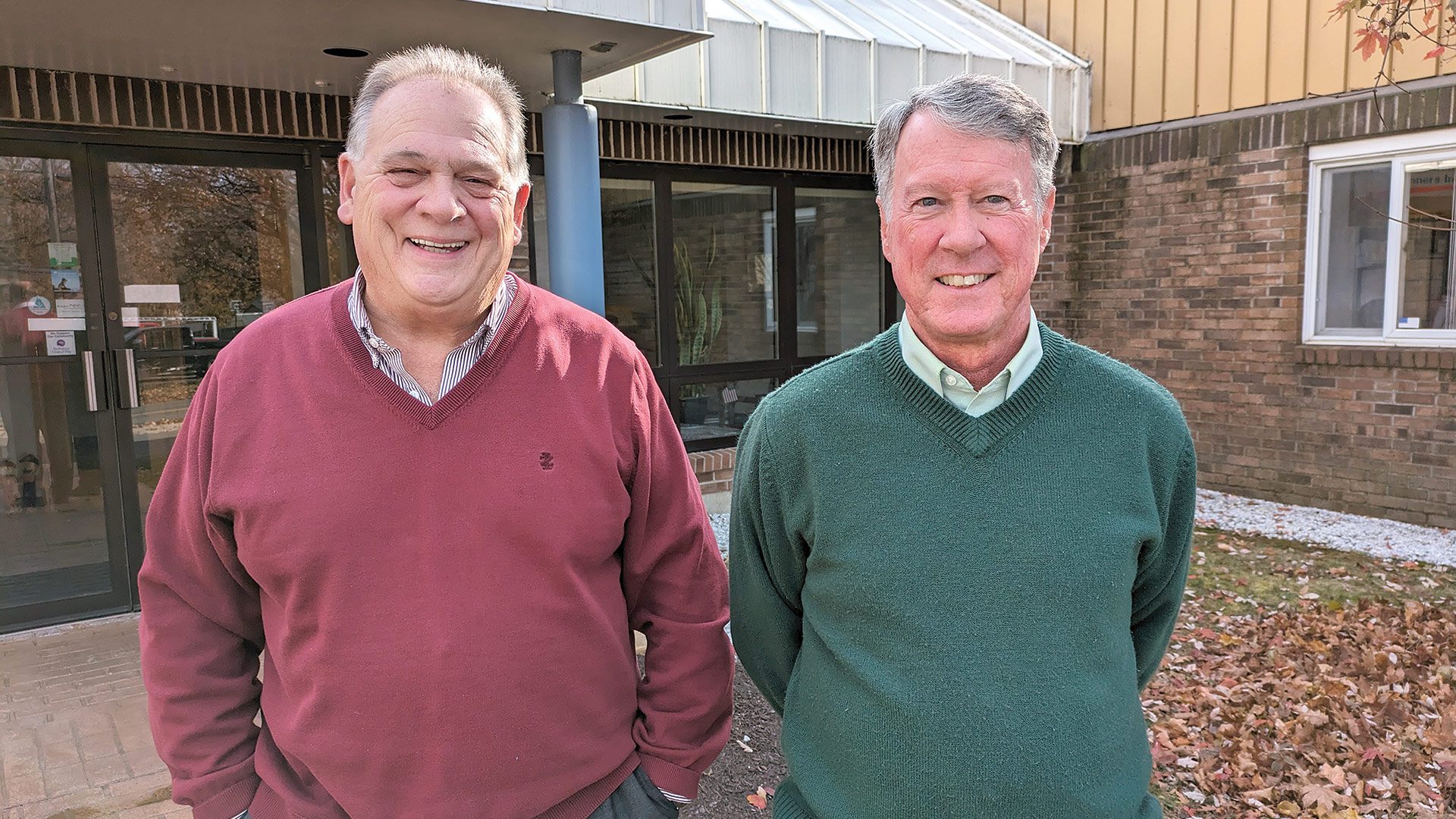
Vice President Vinny Magnano (left) and President Jeff Noble.
Western Mass. is home to dozens of architecture firms. And engineering firms. And land-surveying companies.
Not too many can say they’re all three.
But over its 75 years in business — it celebrates that milestone early in 2024 — Hill-Engineers, Architects, Planners Inc. has evolved into a entity that can manage all those aspects of a project. And President Jeff Noble says that broad expertise sets Hill apart in its field — or, more accurately, fields. It’s also a strong buffer against shifting economic tides.
“We’re organized in three departments — architecture, engineering, and civil surveying — and it’s seldom that you get all three of those going gangbusters all at once,” Noble explained. “Sometimes we’re very fortunate, but other times, one might wane a little bit, while the other two are going well. That diversity of services has carried us along, so we’re able to sustain the level of employment and the types of services we offer. That’s been a big benefit.”
The company’s roughly 40 employees reflect that range: architects; structural, mechanical, and electrical engineers; civil engineers, land surveyors, and survey technicians; and project managers, designers, and drafters in all three niches.
For instance, “we did a brand-new facility for Standard Uniform Services. We started with the permitting, the site development, the architecture, the engineering, and designed that whole facility for them,” Noble explained, adding that it contracted with Forish Construction on the build. “That range of services has allowed us to provide all that, though it’s not always necessary that you need all those services together.”
“A lot of architectural firms are just architectural firms, and they have to go to get an engineer for structural, mechanical, electrical, civil … that’s not part of their company. In Western Mass., very few of those have combined engineering and architecture — and certainly not land surveying besides.”
Hill-Engineers, Architects, Planners was established by William T. Hill in 1949 to provide mechanical-engineering design services to the robust paper industry of the Berkshires. It has called Dalton, a small town just east of Pittsfield, its home since its opening.
“Mr. Hill was a paper-mill engineer for Crane & Co. here in town, and he evolved from there,” Noble said of the company’s founding. “He grew little by little and did structural engineering, electrical, and mechanical engineering, strictly for the pulp and paper business.”
Vice President Vin Magnano came on board in 1975, and the company’s work and client base started to expand beyond paper into a wide range of commercial and industrial clients — still primarily engineering, but moving gradually into some design work.
“Then it just started to evolve organically to include more architectural work,” Noble added. “And we had engineering here to offer as backup for an architectural project, so it made a lot of sense.”
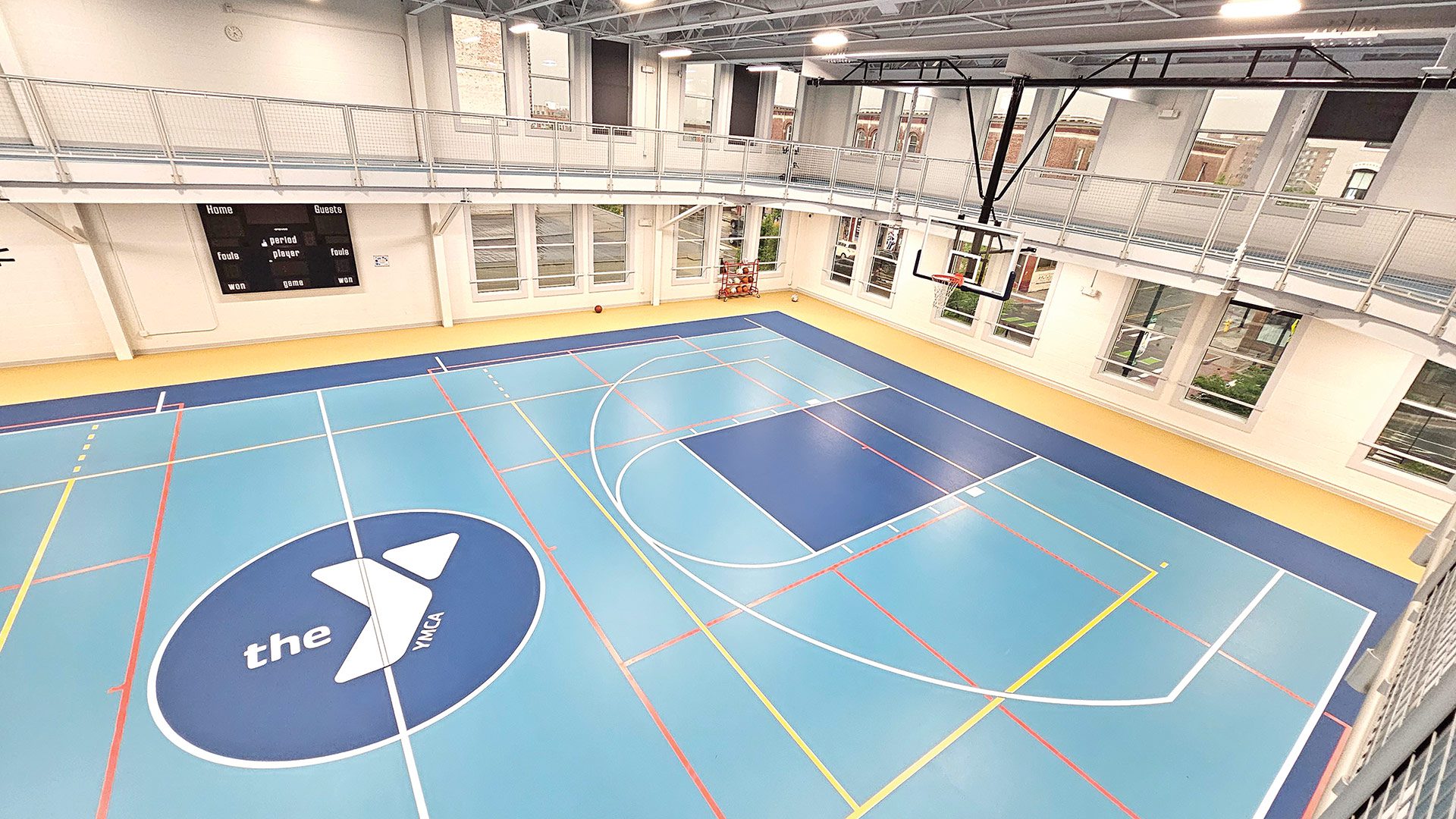
This Berkshire Family YMCA project includes a pool, court, elevated track, and fitness room.
Magnano recalled that “when I came here — I was just a kid, in my 20s — the only architecture we did was to put up a building that covered the machinery; that’s all they cared about. But we started changing after I was here a few years.”
In 1980, a group of five employees purchased the fixed assets of the founder and changed the company’s name to Hill Engineering Inc., and the company began to expand its footprint further in the fields of architecture, engineering, and surveying. In 1986, the company’s leadership contacted Noble, who had worked there before, to head up the growing architectural group. He was intrigued by Hill’s new model.
“I said, ‘yeah, that sounds like a good opportunity,’ and it turned out it was,” he told BusinessWest, adding that, as an architect, “I always appreciated having engineering in-house. A lot of architectural firms are just architectural firms, and they have to go to get an engineer for structural, mechanical, electrical, civil … that’s not part of their company. In Western Mass., very few of those have combined engineering and architecture — and certainly not land surveying besides.”
The company name was changed again in 1987 to Hill-Engineers, Architects, Planners, Inc. to better reflect these expanded areas of service.
“We still do an awful lot just like we always have: we listen to our clients and respond to their needs. They come to us with a problem to solve, and we solve the problem, and move on to the next one.”
“We just started growing the architectural side of the business, doing more commercial work and some residential, institutional, recreational … lots of different types of projects that weren’t industrial. We added staff, and the company has grown over the years.”
Industrial Evolution
Over the decades, Hill-Engineers, Architects, Planners has performed work for dozens of the most recognizable names in Western Mass., including General Dynamics, General Electric, Berkshire Health Systems, Union Carbide, Solutia, Kanzaki, and Smith & Wesson, as well as numerous colleges and universities; several Berkshire County municipalities; recreational, religious, and commercial entities; cultural institutions like Berkshire Museum, MASS MoCA, the Clark, and Mahaiwe Performing Arts Center; and land subdivisions throughout the region.
“When the architecture started to evolve from the paper mills, it was still industrial-based, no commercial; we hardly ever did banks or colleges or any of that,” Magnano said. “It was really driven in the industrial.”
Today, the firm boasts many long-time clients in all those sectors above, some for 40 years or more, he added.
Its acquisition of West Stockbridge Enterprises became an opportunity to get into the land-surveying and civil-engineering aspect, Noble added. “It, again, broadened our range of services that we can provide to our clients, whether it was strictly a subdivision survey or supported an architectural project. Clients say, ‘hey, I want to build something,’ and they’ve got to go through all the permitting aspects, site design, maybe find a site, do site analysis. All that started to become services we could provide for our clients.”
Meanwhile, in the engineering group, Magnano said, “we still do pretty much every discipline except fire protection; we partner with a company in Albany for all our fire-protection work.”
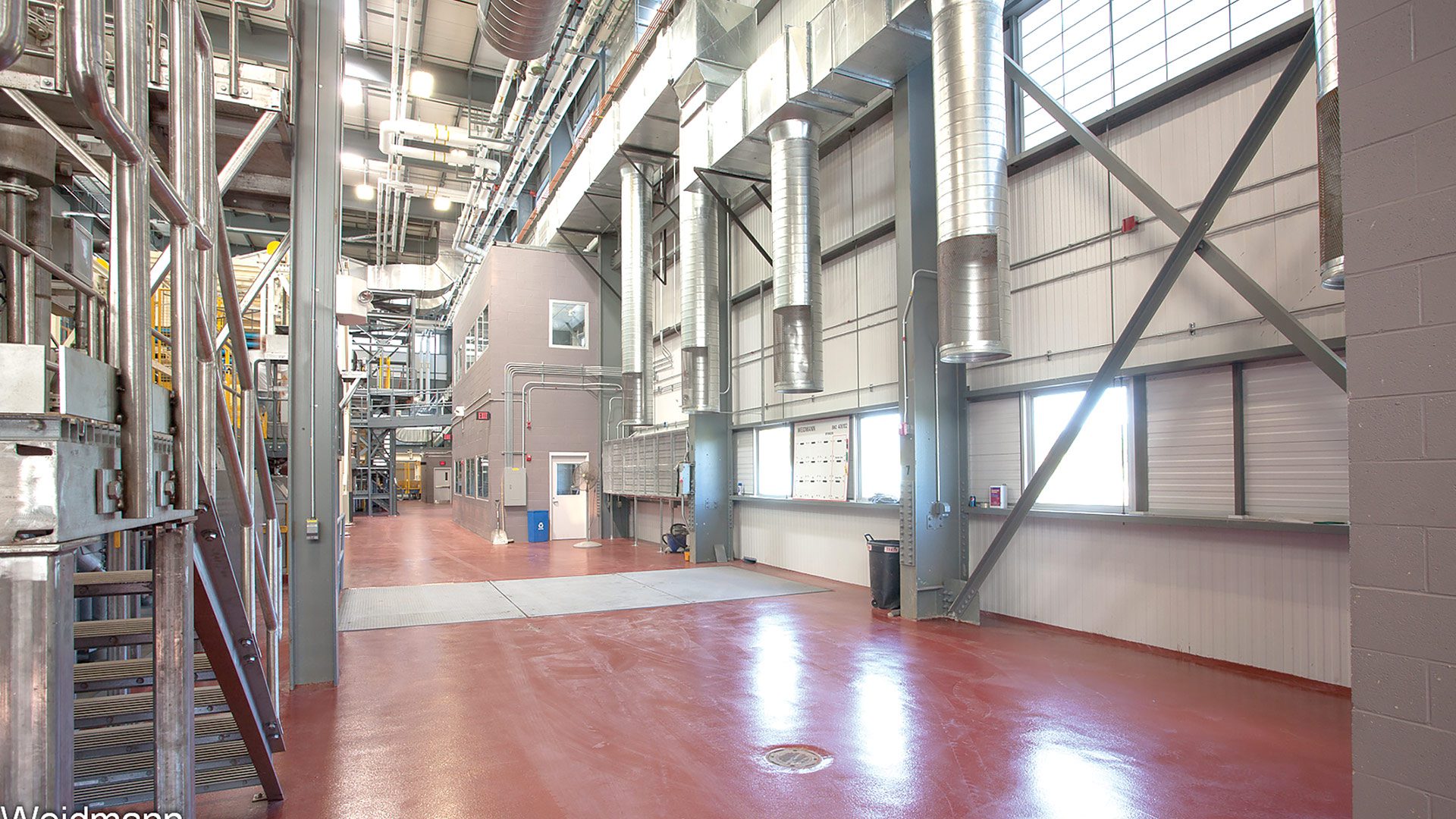
The Weidmann Electrical Technology facility in St. Johnsbury, Vt. is among the firm’s largest projects.
The firm’s radius of work is typically about 50 miles, though it has done major projects outside that, including a major expansion of Weidmann Electrical Technology’s paper mill in St. Johnsbury, Vt., one of that region’s largest employers, a little over a decade ago — about 35 years after Hill first worked on a project for Weidmann.
“They were losing their edge in the market, in the industry; Germany and other places were building new, high-tech stuff. So they spent $40 million doing a new addition on the old addition. We did everything, right from the site work,” Magnano said. “That was probably one of the most unique jobs we’ve done, and we were literally in there from day one — about four years. That was a big one.”
Over the decades, Hill has seen a number of changes, from technology to the way projects are bid. For one thing, there are fewer long-term, local relationships with clients because of consolidation, with clients being purchased by larger entities all the time. “So your companies that used to be local are now owned by a company that’s out of Springfield, Illinois or something,” Noble said. “You don’t have the same relationship, unfortunately.”
Meanwhile, codes and regulations have become more challenging, and an emphasis on energy efficiency and sustainability has impacted how projects are designed, he added. “But we still do an awful lot just like we always have: we listen to our clients and respond to their needs. They come to us with a problem to solve, and we solve the problem, and move on to the next one.”
Welcome Mat
One negative trend that has impacted businesses of all kinds has been recruiting and retaining talent, and Noble said Hill has been able to maintain a steady staff, but it’s not always easy, especially with engineers.
“You don’t see people applying. It used to be people would come in, knock on the door, send a résumé pretty routinely. Now we can’t even solicit them. We go out and try to get them, and no responses,” he told BusinessWest, adding that Hill’s headquarters in the Berkshires can be a problem for some. “Our location just doesn’t seem to have the attraction for younger people. They’d rather go to the cities where there’s potential for maybe more glamorous or high-profile types of work.
“Students are still enlisting in engineering and architecture schools, but they don’t tend to come back here,” he added. “They go to UMass or Boston for college, but then they won’t come back to the Berkshires to work. That’s what we see as the issue.”
Still, the firm has managed to attract employees from the Pioneer Valley and the Albany, N.Y. areas, and it has also maintained relationships with trade schools to bring young people in for co-op experiences, some of which have resulted in hires over the years.
“You don’t have to necessarily get a master’s in such-and-such; you know you can come out of trade school and go to work as a computer operator here, and we’ll put you to work,” Noble explained. “You can learn on the fly, but under the tutelage of professional engineers.”
Magnano added that “we’ve been fortunate enough to get some individuals whose roots are in Dalton, or close by, and wanted to come back to Dalton. Over the last five to 10 years, we’ve really brought in another whole generation that hopefully will keep it going.”
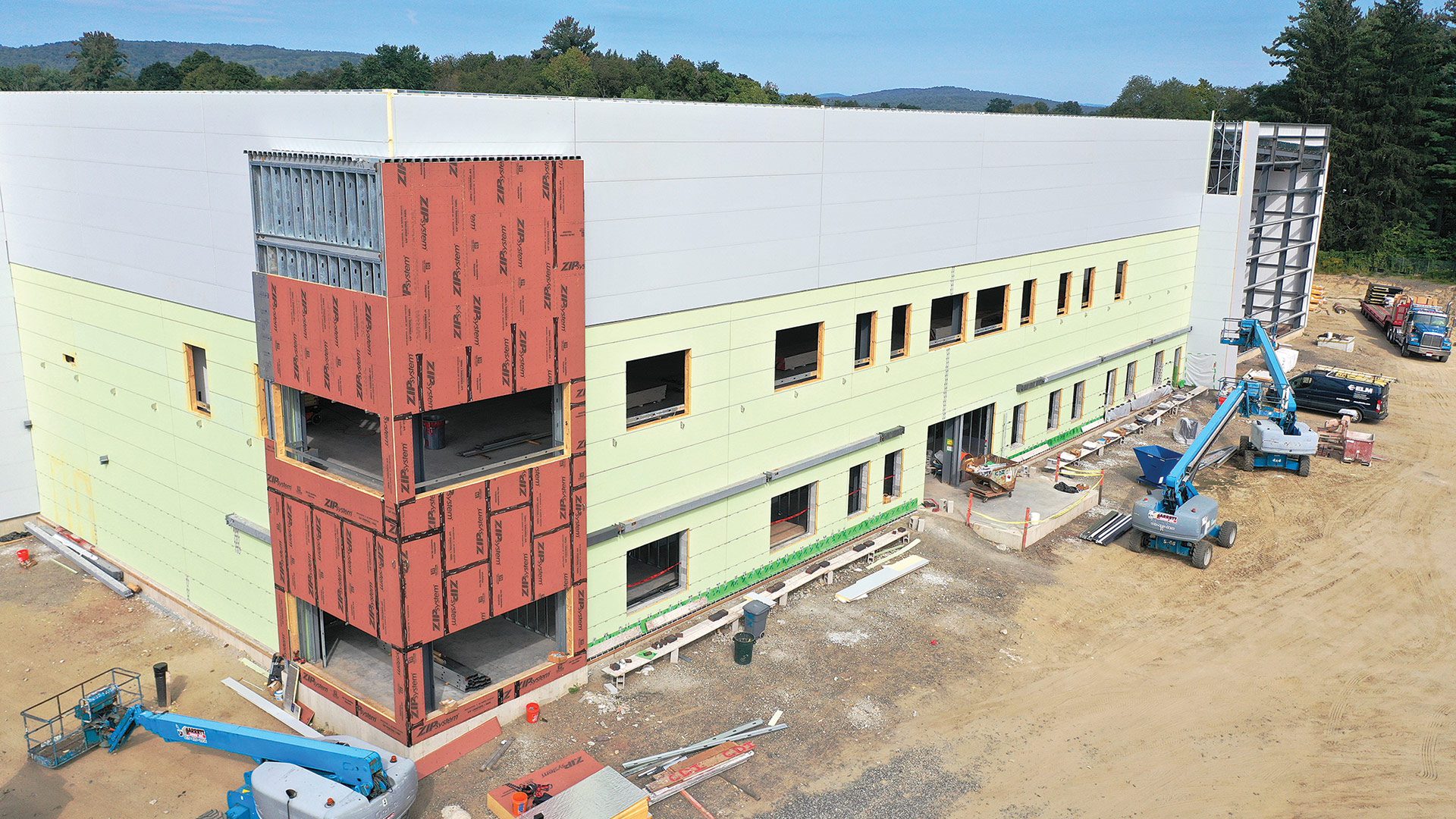
Here, the envelope and siding go up on the NUPRO plastic-fabrication factory in South Deerfield.
Hill-Engineers, Architects, Planners has been community-minded in other ways as well, Noble said, by supporting local nonprofits, social organizations, churches, and other causes in a number of ways.
“The [Dalton] Community Recreation Association is one, whether we do our work at a reduced fee or we support them through ads in their programs, or we sponsor a basketball team or baseball team.”
The firm also supports the Pittsfield YMCA, for which it just completed a major $12 million renovation, including a pool, court, elevated track, fitness facilities, and more. Often, Hill is able to provide services to nonprofit clients at a lower cost, or in an in-kind way, he said. “It works both ways. We get good experience out of it, and the client gets the service at a more affordable level.”
The firm’s leadership and employees also sit on boards and are encouraged to volunteer in the community, Noble added.
Shovels Out
As part of its 75th-anniversary year, the team at Hill is planning to bury a time capsule that includes, among other artifacts, some tools of the trade in 2023, and then unearth it 25 years from now, at the company’s centennial, to see how much their industry — sorry, industries — have changed.
Things have certainly changed plenty since 1949.
“I think we’re just very proud of having carried on Mr. Hill’s legacy here for 75 years,” Noble said. “I think he’d be really happy to see where we’re at. And who knows? Maybe we’ll keep it going for another 75.”





